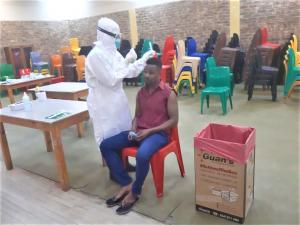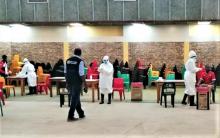Walvis Bay COVID-19 Strategy: Test, Isolate and Treat
25 June 2020. Namibia COVID-19 cases increased from 32 to 90 in a week and a half’s time after a quiet period of about 45 days without a case. Approximately 60 % of the new reported cases are from Walvis bay in the Erongo Region, the only region reporting a cluster transmission to date. Due to the ongoing transmission of COVID-19 cases in the towns of Walvis Bay, Swakopmund and Arandis, they were put under Stage Three with some restrictions while the rest of the region moved to Stage Three without restrictions and the country to Stage Four.
At a press briefing on 23 June 2020, the Governor of the Erongo Region, Honorable Neville Andre, said that the increasing number of cases in the Walvis bay Local Authority area warrants targeted public health interventions to contain the spread of the virus. He informed the members of the media that his office, Ministry of Health and Social Services, Walvis bay Municipality, Security Cluster and other partners are expanding the testing strategy for Walvis Bay to ensure that no case is missed. The region is doing this to establish the extent of COVID-19 spreading in the Walsvis Bay District and for evidence-based planning and response.
The response team initially established a testing centre at the Kuisebmund Community Hall to allow for contacts of known cases to access testing and anyone who had flulike symptoms. Over 400 people were tested between 20 June 2020 to 23 June 2020. Given the results of this initial testing, the district decided to expand the testing strategy beyond the immediate contacts of known cases to include health care workers in health facilities, pharmacies, and frontline service providers such as security cluster members, cashiers, tellers, receptionists, security guards, cleaners, shops, supermarkets, banks, barber shops, hair salons, car wash, vendors, drivers, ship operators/staff, and factories. The aim is to test 2000 people in 10 identified sites from 24 to 27 June 2020.
Commenting on the situation in Walvis Bay, the WHO Representative to Namibia, Dr. Charles Sagoe-Moses said that ‘it is still possible to interrupt the spread of the virus, provided that the region put in place strong measures to detect the disease early, isolate and treat cases, actively trace all contacts, promote social distancing measures, hand hygiene, respiratory etiquette and wearing of masks in public spaces. . The interventions in the Erongo region seems to mimic this sentiment with an intensified response involving all pillars of the response.
Dr Sagoe-Moses further applauded the government’s leadership from the Namibian Presidency and the Ministry of Health and Social Services for acting promptly and early which led to the slowing down of the pandemic in the country. He said ‘slowing down the epidemic saves lives and buys time for preparedness as we have witnessed in the past 3 months. Every day we can slow the epidemic is another day hospitals can prepare themselves for cases. Every day we slow down the epidemic is another day government can prepare their health workers to detect, test, treat and care for patients’. He concluded by acknowledging that there is need to strengthen certain aspects of the national and regional response and that the country should make use of this time to address these.
Given the rapid increase of COVID-19 cases in the Country and in certain communities especially Walvis Bay, the public health advice to people who are concerned they may have been in contact with or have contracted COVID-19 is to follow standard guidance of seeking early medical attention from a local health care provider/health facility when they are unwell and if possible, calling ahead to the medical facility, so they are able to provide instructions and prepare for the visit.




